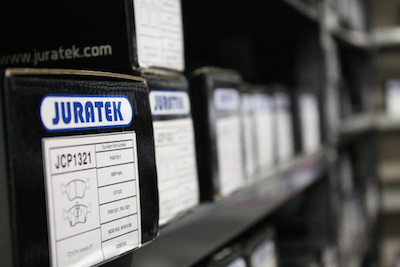Christopher Shelley takes CAT on tour around Dymag Wheels production facilities in Chippenham
Whether you’re a fan of superbike racing or a sports car enthusiast, there’s no doubt you would have come across Dymag Wheels, who have produced wheels for 43 years and more recently introduced some extremely light – and very sexy – rims made from carbon fibre.
The firm has been busy of late with a new Research and Development programme, designed not only to bring the wheels to market, but also implement an efficient and profitable manufacturing process, as Christopher Shelley, Chief Executive of Dymag Wheels, explains: “The product we have developed with the Advanced Manufacturing Supply Chain Initiative – a funding programme to improve global competitiveness, has enabled us to develop a product and low cost high volume manufacturing process, which are our two key things to market”. Shelley has also been working closely with the National Composite Centre in Bristol on the production of these carbon wheels.
PRODUCTION
We were keen to see the production process in action. “Typically we make the wheels to order which includes the colour, style and application before we distribute them to customers” said Shelley, adding that it would not be unusual for a set of four wheels to cost £14,000.
The first stop on our tour was the Machine Shop, home to milling machines whose purpose was forging motorcycle wheel hubs and centerpieces to the wheels, before ending up in the Paint Room next door, which on our visit, had a number of BAC Mono Wheels awaiting a spray job. However, the unit that caught most of our attention was a two- minute drive up the road where the main production is based. Shelley elaborated: “We are looking to develop the manufacturing process here with the help of the National Composite Centre, where we have a couple of other rooms like that over there; developing machines to automate the manufacturing process.” He added: “We lay up carbon wheels individually where we look to bring more semi- automation to speed up the manufacturing process and improve repeatability”. If all goes to plan, Shelley said the facility is hoping to roll out 10 carbon wheels per day.
PROJECTS
Before hitting the road, Shelley wrapped up proceedings by discussing the firms business propositions for 2017, which includes building a UK and international dealer and distribution network. “We have a lot of investment going on where we’re looking to Dymag Wheels in production progressively build up our own distribution company”, replied Shelley. “Dymag Japan has been set up in Yokohama, we are also setting up Dymag USA, and selling directly to dealers in the EU from our UK base”, adding that the Dymag China group will complete the companies plans for ‘world domination’.
Shelley informed CAT that the wheel manufacturer is going through a tooling programme to expand its current range of sizes and fitments and will be presenting its next generation product at the SEMA show in Las Vegas. All of this, plus housing its seven units under one roof in a 20,000 – 40,000 sq ft facility in the Wiltshire area, it’s fair to say the company’s hands are full at the moment. We definitely will roll by for another visit to see Shelley and the team in their new digs later this year.











Go to comments